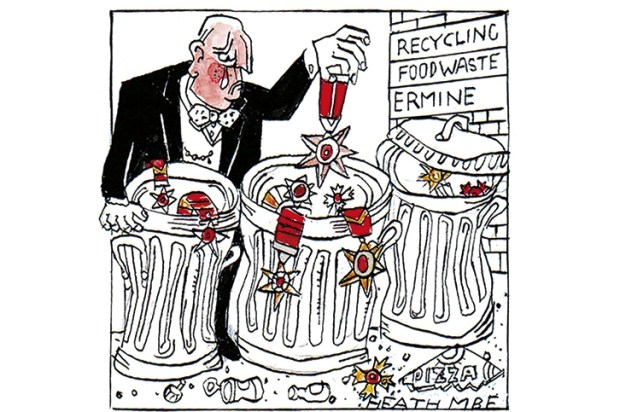Newsmax, the magazine of the eponymous US conservative multiplatform network, carries a full page advertisement for ‘The Presidential 1911 Pistol’, produced by an organisation called Heroes and Patriots. This ‘beautifully engraved’ and ‘fully functional’ Limited Edition Colt Government 1911 A1 Semi-Automatic Pistol is gold-plated and holds 12 rounds. Its purpose is to ‘unite with our President and show support for his policies’. On the grips is a portrait of Donald Trump surrounded by Celtic scrollwork and thistles, ‘honoring the President’s Scottish heritage’. One side of the barrel proclaims ‘Make America Great Again’, the other ‘Drain The Swamp’. On top, ‘America First’ and ‘End Fake News’. The pistol ‘will become a treasured Family Heirloom worthy of passing down to many generations.’ It is not available in California or Massachusetts. The weapon is manufactured by Walther in Germany, though whether to honour the President’s German heritage is, like the price, not stated. I cannot pretend it looks like a lovely work of art, but I am genuinely, unsneeringly impressed by a culture which wishes to celebrate its elected leader in this way. Imagine trying to do something similar for our politicians — the Theresa May Strong and Stable Pop-gun or the Jeremy Corbyn White Flag. The only successful British version I can imagine would be a pair of Purdeys in honour of our future leader Jacob Rees-Mogg, one gun for each barrel of his surname. Luckily, the Rees-Mogg coat of arms distinguishes between the two barrels. The crests are ‘A swan argent, wings elevated or, holding in the beak a water-lily slipped proper (for Rees)’, and ‘Between two spearheads erect sable a cock proper (for Mogg)’. These would be lovingly engraved accordingly. On both guns would appear the family motto ‘Curae pii Diis sunt’ (‘The pious are in the hands of the Gods’) — words, I think, from Ovid.
The career of the new President of Mexico, Andrés Manuel López Obrador (‘Amlo’), suggests he is a populist. He jumps from party to party and ends up founding his own. He advocates price ceilings for tortillas. Disputing his defeat in the presidential election of 2006, he proclaims himself ‘legitimate President’, wearing a presidential sash. Yet the BBC — with the honourable exception of Justin Webb on Today — avoids calling Amlo a populist, attributing the word only to his enemies (‘His critics call him a cheap populist’). This contrasts with its ready application of the word to Trump, Orban and Salvini. Amlo, of course, is left-wing, and the three just mentioned are not.
As someone who follows the news on Radio 4 at 6, 7 and 8 each morning, I notice that the bulletins begin very leftish and become slightly less so later. I assume the unit responsible, ‘Newsgathering’, works through the night from its default political position. So it relies heavily on the ready supply of ‘news’ from pressure groups, NGOs and right-on charities: ‘A new report warns that millions will die unless the government immediately injects £400 billion into X’; ‘A survey by an independent, Brussels-based think tank reveals that independent, Brussels-based think tanks believe that Brexit will be a disaster for Britain’. As actual news gets going, this dreary propaganda is sometimes dislodged by reality. The Times, though much better at news than the BBC, has a similar Remainer default. Its first edition on Monday ran the headline ‘50,000 jobs lost as high street hit by Brexit and online rivals’, despite the fact that the story mentioned Brexit only once (‘Brexit-fuelled inflation’), and only in the fifth paragraph. In later editions, someone noticed: the headline became ‘High street sheds 50,000 jobs in battle with internet rivals’. If you read the report, you could see that the cause of high street problems, as well as internet rivalry, was the rise in business rates, not Brexit at all.
In June 1937, The Spectator carried a piece about the Rhön Bruderhof, a ‘Hutterite’ community recently driven out by the Nazis. ‘The members were simple Christians, and could not, in loyalty to their Master, give either the Hitler… salute, or fly the swastika flag’. On 14 April, ‘while Hitler and Lansbury [the then leader of the Labour party] discussed peace, the community was raided by a small army of police and dissolved’, losing its property. Exiled, it re-started as the Cotswold Bruderhof in Wiltshire. Subsequent events, however, doomed the enterprise. With war came the threat that the Bruderhof’s Germans would be interned as ‘enemy aliens’. Some halfwitted locals even suspected them of building a German submarine in their landlocked gravel pit. Their cause was pleaded by enlightened spirits like Wyndham Deedes, uncle of the late, great Bill, Victor Cazalet, Nancy Astor and George Bell, the Bishop of Chichester now posthumously libelled by his own church for unproved child abuse. The community had to leave, however, going to Paraguay and later to the United States. Its story is related in a new book by Ian M. Randall called A Christian Peace Experiment. I know the Bruderhof, because they eventually came back. Three hundred of them flourish next door to us in East Sussex. There they practise their plain, collective Christianity, with its agriculture and its successful manufacture of wooden toys. Their horse-drawn carts are to be seen in the lanes. They are good neighbours. I am glad The Spectator noticed their troubles 80 years ago. Aged 190, it can be proud of its long understanding that religious freedom is central to all freedom.
In these long, hot days, we eat our supper outdoors. It is light. One evening this week, I lay down on the garden bench and looked up at the still-blue sky. Far above me, I could see a house martin gliding and fluttering in the currents. It was a particularly welcome visitor, because we used to have plenty in our eaves until sparrows vandalised their nests before they arrived. Since then, no martins have nested. Advice on enticing them back would be gratefully received.
Got something to add? Join the discussion and comment below.
Get 10 issues for just $10
Subscribe to The Spectator Australia today for the next 10 magazine issues, plus full online access, for just $10.
You might disagree with half of it, but you’ll enjoy reading all of it. Try your first month for free, then just $2 a week for the remainder of your first year.















Comments
Don't miss out
Join the conversation with other Spectator Australia readers. Subscribe to leave a comment.
SUBSCRIBEAlready a subscriber? Log in